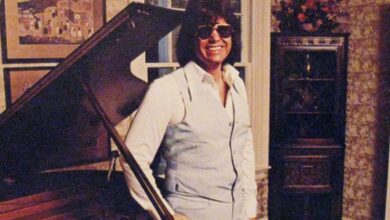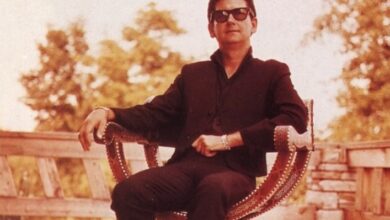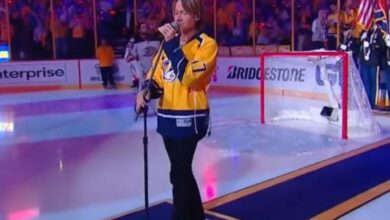Listeners imagine Alison Krauss’s voice with Jamey Johnson as what angels would sound like when they sing
The live performance of “Seven Spanish Angels” by Jamey Johnson and Alison Krauss in Washington D.C. stands as a stunning and heartfelt tribute to the iconic duet originally performed by Willie Nelson and Ray Charles. This memorable rendition occurred during the 2015 Gershwin Prize Tribute Concert, an event specifically designed to honor Willie Nelson’s profound contributions to music. Both Johnson and Krauss, renowned for their deep-seated ties to country and Americana, brought their distinctive styles to the stage, creating a moment that resonated deeply with everyone in attendance.
From the moment the first notes began, Alison Krauss’s angelic voice seamlessly intertwined with Jamey Johnson’s rich, deep tone, delivering a soulful rendition that held the audience spellbound. Their interpretation remained faithful to the original essence of the song, while simultaneously allowing each artist to highlight their unique vocal strengths. Krauss’s pure, ethereal voice added a layer of gentle softness, contrasting beautifully with Johnson’s gravelly tone, which introduced a depth and gravity that enriched the performance. Together, their harmonies wove a hauntingly beautiful tapestry of sound that visibly moved the crowd.
The narrative of “Seven Spanish Angels,” which portrays the poignant story of two lovers facing a tragic end, was brought to life through the emotionally charged delivery of both performers. The simplicity of their stage presence emphasized the song’s powerful storyline, allowing the audience to fully immerse themselves in the emotional journey. With minimalistic instrumentation supporting them, it was evident that the true focus was on their voices, each note capturing the intensity and sorrow of the lyrics, and holding the audience in a collective embrace of emotion.
Jamey Johnson, often likened to country legends such as Waylon Jennings, infused the performance with his signature outlaw country style. His deep, resonant voice brought a touch of grit that perfectly balanced Krauss’s more delicate tones. Johnson’s ability to convey raw emotion through his music added a layer of authenticity and passion to the performance, making the song’s tragic narrative even more compelling. His presence on stage was commanding yet genuine, reflecting his stature as a respected figure in the country music scene.
Alison Krauss, a multi-Grammy award-winning artist, is celebrated for her ability to deliver performances that are both technically flawless and emotionally resonant. Her control, range, and sensitivity to the song’s themes were on full display during this tribute, making the performance feel intensely personal. Krauss’s mastery of her craft allowed her to navigate the song’s delicate moments with grace and strength, ensuring that every emotion was conveyed with precision and heartfelt sincerity.
For fans of the original “Seven Spanish Angels,” this performance served as a fitting homage to the classic by Willie Nelson and Ray Charles. Yet, Johnson and Krauss managed to infuse the song with their own unique flair, breathing new life into the familiar melody while honoring its enduring legacy. The haunting refrain of “the angels took another angel home” resonated with even greater intensity as their voices intertwined, creating a powerful and moving experience that transcended the original version.
Beyond their vocal prowess, the chemistry between Krauss and Johnson on stage was undeniable. Their mutual respect for each other as artists and for the song itself was evident, translating into a performance that felt both authentic and deeply heartfelt. Their interactions on stage were marked by a seamless synergy, as if they had been performing together for years, enhancing the overall impact of the song through their collaborative energy and shared passion.
The emotional depth of the performance was further amplified by the minimalistic approach to instrumentation. By keeping the backing arrangements simple, the focus remained squarely on the vocal performances, allowing the audience to fully appreciate the nuanced delivery and the interplay between Krauss’s and Johnson’s voices. This stripped-down presentation highlighted the song’s narrative and emotional weight, making each moment on stage feel intimate and profound.
Jamey Johnson’s background as a storyteller in country music added another layer of richness to the performance. Known for his ability to craft songs that delve deep into personal and emotional themes, Johnson brought a level of sincerity and introspection that enhanced the song’s tragic narrative. His connection to the lyrics was palpable, making the audience feel every sorrowful note and every heartfelt word, as he conveyed the story with both power and tenderness.
Alison Krauss’s contributions to the performance were equally significant. Her extensive experience in bluegrass and country music, combined with her exceptional vocal control, allowed her to navigate the song’s emotional landscape with ease. Krauss’s ability to convey complex emotions through her voice added a layer of depth to the performance, making each verse and chorus resonate with the audience on a deeply personal level. Her collaboration with Johnson was a perfect blend of strength and sensitivity, creating a harmonious balance that elevated the entire performance.
In the end, the performance of “Seven Spanish Angels” in Washington D.C. by Jamey Johnson and Alison Krauss was more than just a cover of a beloved song—it was a testament to the enduring beauty of classic country music and the extraordinary talent of two exceptional artists. Their rendition stands as a memorable tribute to the legends who originally brought the song to life, while also showcasing the timeless appeal of Johnson and Krauss as vocalists in their own right. This performance not only honored the legacy of Willie Nelson and Ray Charles but also underscored the power of live music to create magical, unforgettable moments that resonate long after the final note has been played.



